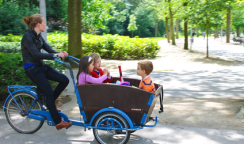Two hours outside a day keeps short-sightedness at bay
 Children need to be outside for at least two hours a day to avoid the risk of becoming short-sighted, according to Erasmus University researcher Virginie Verhoeven.
Children need to be outside for at least two hours a day to avoid the risk of becoming short-sighted, according to Erasmus University researcher Virginie Verhoeven.
In addition, they should also keep their use of smartphones and tablets to a minumum and not read in bed, Verhoeven says in her thesis thesis published on Tuesday.
Although short-sightedness is mainly hereditary, environmental influences can play a part in the decline of eyesight, Verhoeven says. It is therefore important to take steps to slow down the process in children.
A high measure of short-sightedness in children (from six upwards) makes blindness or serious visual problems three times more likely in later life.
According to Verhoeven, 90% of young people in Asia are short-sighted as a result of spending most of their time indoors. The number of short-sighted children in West Europe is also growing, with around 50% already affected.
Being outdoors helps, says Verhoeven. Not only are distances greater allowing the eyes to relax, but daylight also releases dopamine in the retina which stops the eye growing too fast, which is what causes short-sightedness.
Thank you for donating to DutchNews.nl.
We could not provide the Dutch News service, and keep it free of charge, without the generous support of our readers. Your donations allow us to report on issues you tell us matter, and provide you with a summary of the most important Dutch news each day.
Make a donation